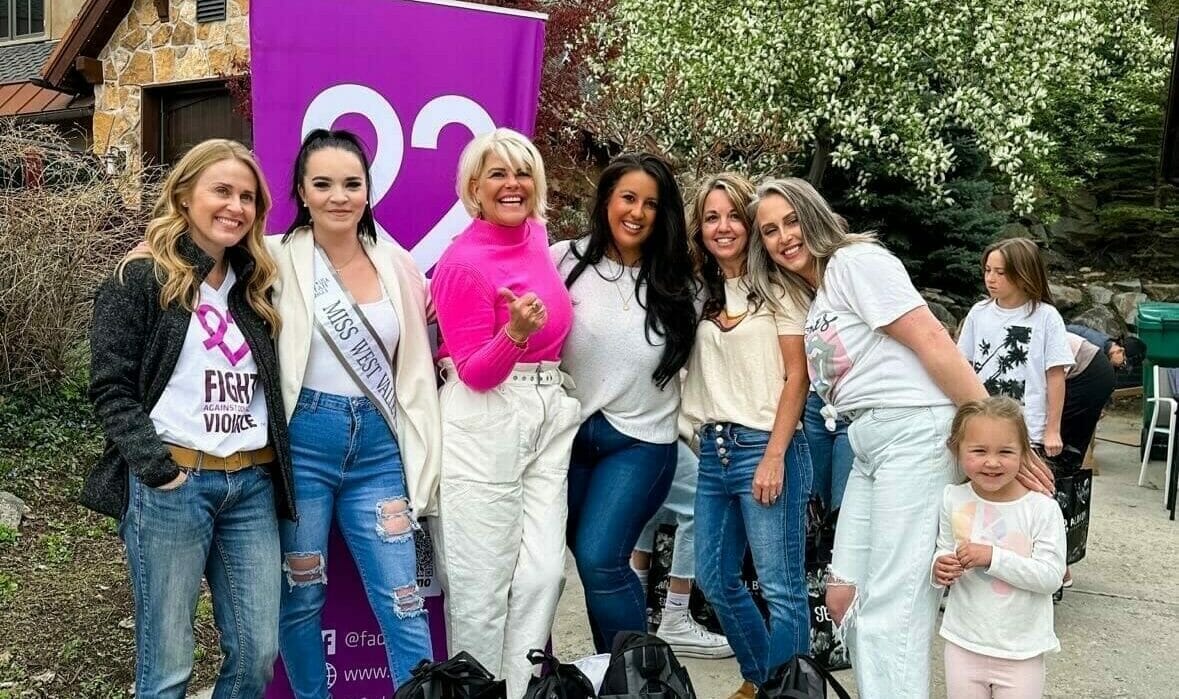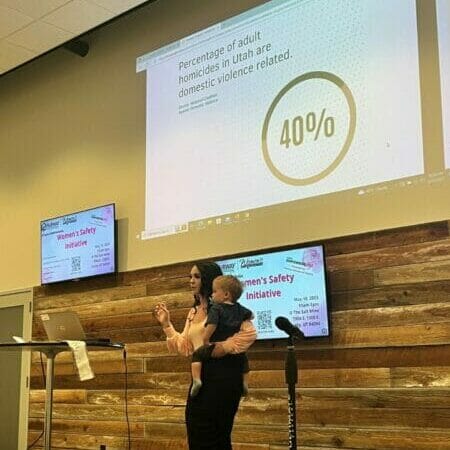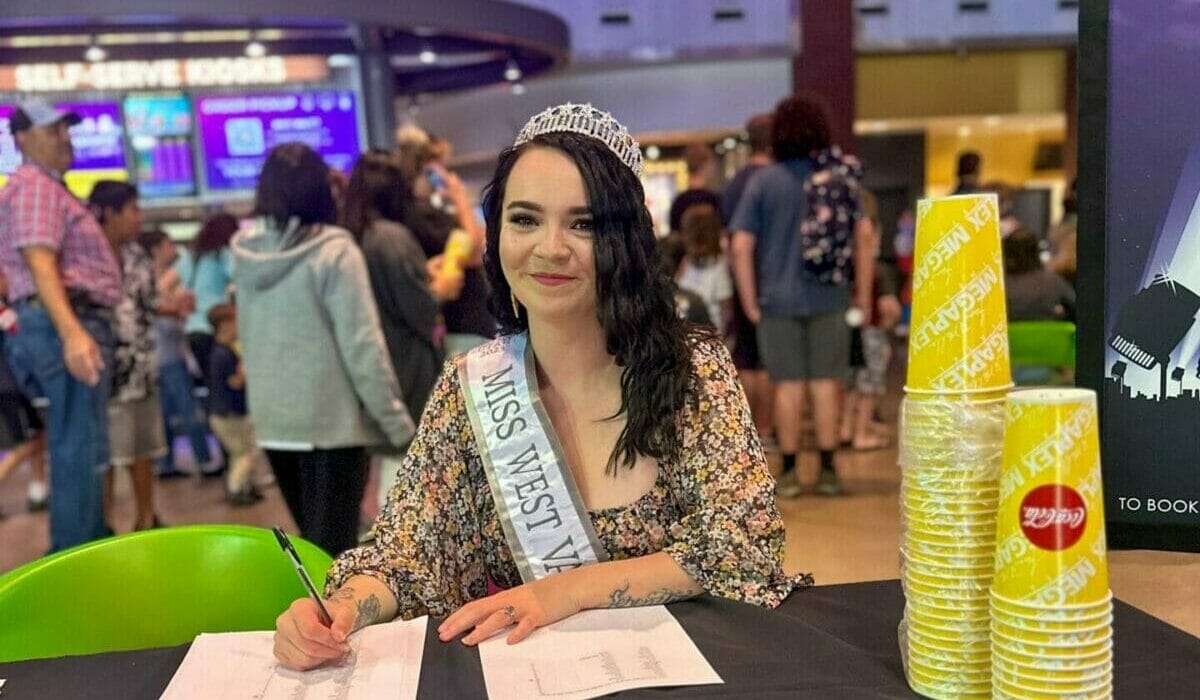Survivor Bridges the Support Gap for Others Who’ve Faced Domestic Abuse

Meet Daily Point of Light Award honoree Mckayla Julian. Read her story and nominate an outstanding volunteer or family as a Daily Point of Light.
Content Warning: Points of Light is proud to share the following uplifting and inspiring story. However, we acknowledge that a small portion below may be difficult for some readers. We encourage you to please care for your own wellbeing above all.
Mckayla Julian never expected to be a nonprofit founder, especially one centered in supporting those who’ve faced the tragic experience of abuse. But after experiencing abuse firsthand, Mckayla understood what other people needed once they left their abusers.
In a single year, Mckayla has helped over 1,500 women and children recover from their trauma with her nonprofit, Pretty Tough Ladies (PTL). She has made it her mission to support women leaving domestic violence situations and to ensure that they’re not alone and not empty handed after they make the vulnerable decision to enter into a new reality. Mckayla is helping others find healing across Utah’s West Valley, and is continuing her own healing along the way.
What inspires you to volunteer?
Pretty Tough Ladies comes from my own pain and my own story. I’m a domestic violence survivor and I wanted to turn my pain into purpose. I noticed that there wasn’t a lot of support in that aspect. We do have shelters and different things like that, but even in the shelters sometimes they don’t have a lot of support groups or a lot of access to resources. I saw support gaps and I started PTL as a support group. From there, we kind of grew into having resources and organizations that we partnered with. Now we can send people in the right direction depending on what their needs are. We also have a little boutique that has hygiene and household essentials for those that need them. We also provide gift cards for gas or groceries if we have them available; we give those to the clients as needed. I started it just based on my own story.
Describe your volunteer role with Pretty Tough Ladies.
We’ve been operating for a little over a year. In that time, we’ve run a couple of events and led support groups. It’s been mostly run by me. We definitely need some more volunteer help. I would love to get more people involved. It can be a lot to take on when you’re doing it yourself. But I love the work, so I definitely want to be involved even moving forward. As more people get involved, I would still love to be a part of it. Just as of right now It’s basically all me.

I wasn’t planning on starting a nonprofit, I simply just wanted to bring women together and support each other. There’s always similar, but different, stories. We’ve all experienced a base of some sort of trauma and mental health battles. I really just wanted to create a support group and then when we realized that it was growing rapidly, we saw this giant need and decided to tackle it. We knew that we needed a nonprofit status in order to really get the help that we needed funding- and permission-wise. I did the whole 501(c)(3) process myself. I didn’t have any attorney to help or anything like that and I got our results back within a month that we were approved. So it was very fast.
Life is so short. You have to go out of your comfort zone to experience things that life has to offer. Being in the state that I was in just three years ago when I had originally left my abuser, I really never saw myself being in the position that I’m in now: happily married with another son. I had a daughter with my abuser. Since then, you know, I’ve had another baby and I’m happily married now. My life has just drastically changed. PTL has drastically changed my life for the better.
What’s been the most rewarding part of your work?
It’s definitely been seeing the lives that we’ve changed and the gratitude from the clients that we serve. We get a lot of messages and testimonials on how we’ve helped people. We see that in our reviews on social media too, and that always makes me feel really good. Because I’m like, ‘Okay, we are making a difference and an impact.’ When you’re immersed in your work, it can be hard to see the difference that you’re making until they tell you. I’ve been on my own healing journey, but I’ve also been able to be a part of others’.
What have you learned through your experiences leading this organization?
I’ve learned that you can want to help everybody, but you can’t help everybody. That’s been a hard lesson to learn. But I have also learned that we have a very large community of world changers who have a passion to give back. We’re not alone in the philanthropy world. That’s also been another learning curve for me, that it’s okay to ask for help. It’s also okay to know that sometimes you have to set boundaries and you’re not always going to be able to help everybody like you want to. But there are others who can step in and help too.

Are there any future partnerships, programs, or events that you are excited about?
I’m actually representing West Valley City, so I’ll know soon if I make it to the Miss Utah pageant, which is coming up. I’m excited about that since pageants are a really big platform for PTL. But I’m also very excited because we’re hoping to get to do our back to school event this year. It’s still in the works behind the scenes. Last year at our back to school event, we were able to help 175 kids receive backpacks and school supplies. Then we were able to help over 60 children get free haircuts. It was amazing, so I definitely would love to do something like that for the fall.
Why is it important for others to get involved in causes they care about?
I always say that there’s not enough of us; we can always use more people who want to be involved in the community and give back. There’s a very dire need for help and for people with a passion to give back to be out there in the field of support groups. Go where your passion is, whether that’s animals, food banks or domestic violence. Every one of us has something to offer.
What do you want people to learn from your story?
Trauma does not define you. There’s so much more to life than what your trauma has withheld from you. I think that finding your purpose within your pain is really important and really crucial.
If you or someone you know has experienced the trauma of sexual assault or rape, you can support them by listening, letting them know you believe them and offering to help them find medical attention or mental health support. Contact RAINN to find help near you or call 800-656-HOPE (4673) to talk to a trained crisis counselor. These services are free and confidential.
Do you want to make a difference in your community like Mckayla? Find local volunteer opportunities.
